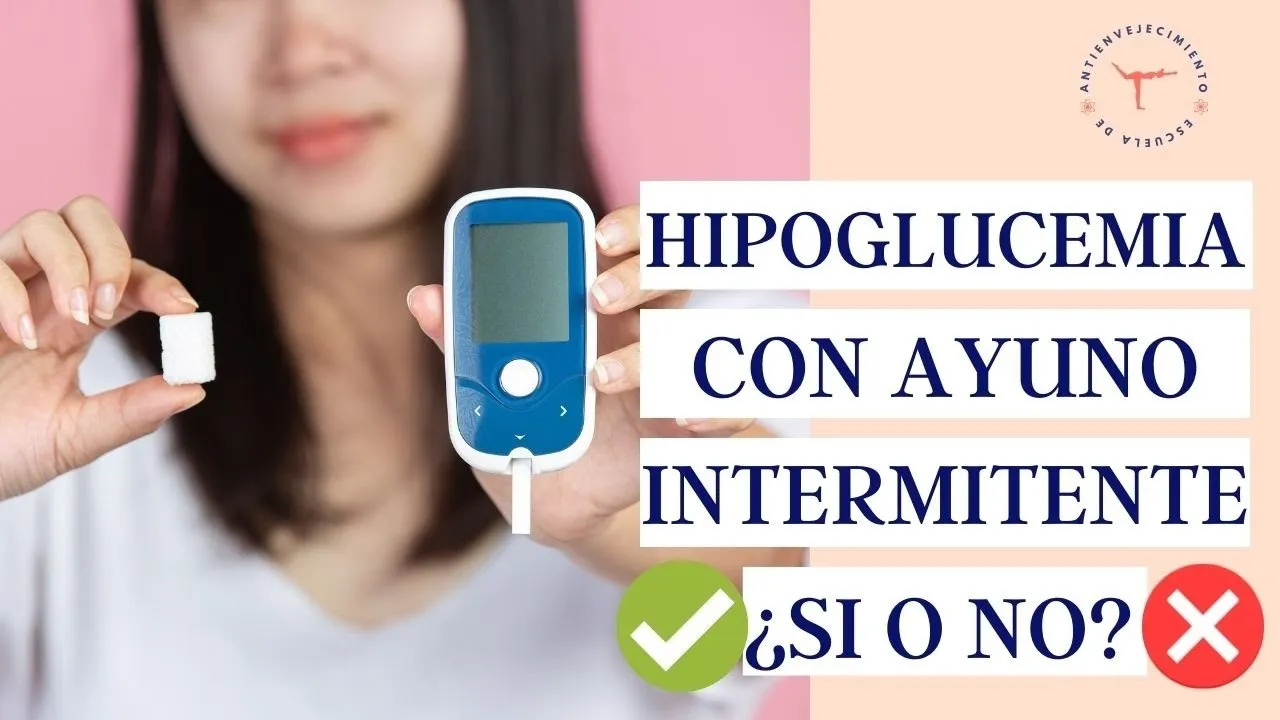Good afternoon,
Do you make intermittent fasting?
I previously practiced it for times with good results but since I am with insulin (three months ago) I am afraid of hypoglycemia.
Do you think it is beneficial less insulin or fasting or that it will be harmful?
Thank you so much!
No signature configured, add it on your user's profile.
@mkthyl, if you get the slow to allow you, you can do it without problem. But you will have to have glucose very stabilized, and always well fed, of course.
Hija de 35 años , diabética desde los 5. Glico: normalmente de 6 , pero 6,7 la última ( 6,2 marcaba el Free)
Fiasp: 4- 4- 3 Toujeo: 20
mkthyl said:
good afternoon,
Do you make intermittent fasting?I previously practiced it for times with good results but since I am with insulin (three months ago) I am afraid of hypoglycemia.Do you think is less insulin or fasting or what will be harmful?Thank you very much
Being well adjusted insulin without problem, you may have a slight descent but nothing worrying.
No signature configured, add it on your user's profile.
Forgive my ignorance, but what is it useful for intermittent fasting?
DM1 desde 1982: Toujeo+Novorapid
Freestyle Libre 3+
@Ricki21, it has helped me to lose 5 kilos that I had left, but I am not a diabetic, so I cannot comment here.It is also true that I already retired and I can be calm.When I worked, I couldn't be eating 15 hours, now.
In the end is saving calories and the body knows.
But there are times that can be done and sometimes not.
Hija de 35 años , diabética desde los 5. Glico: normalmente de 6 , pero 6,7 la última ( 6,2 marcaba el Free)
Fiasp: 4- 4- 3 Toujeo: 20
@Regina: Thank you for your answer
DM1 desde 1982: Toujeo+Novorapid
Freestyle Libre 3+
ricki21 said:
forgive my ignorance, but what is it to do intermittent fasting?
For many things:
Weight loss: intermittent fasting can help reduce total caloric intake, which can lead to weight loss.In addition, it can increase the metabolic rate and promote fat burning.In my case, fasting did not produce weight loss, you don't necessarily ingest less calories
Improvement of insulin sensitivity: intermittent fasting can help improve insulin sensitivity.This can contribute to better blood sugar control.
Promotion of autophagy: During fasting, the body activates a process called autophagy, which is the elimination and recycling of damaged or not necessary cell components.This can have positive effects on longevity and cell health.
Inflammation reduction: It has been shown that intermittent fasting decreases inflammation markers in the body.
Improvement of brain function: Some studies suggest that intermittent fasting can have positive effects on brain health.It has been observed that it improves neuronal plasticity, the production of neurons and protection against neurodegenerative diseases.
HEALTH BENEFITS: Intermittent fasting can help reduce LDL cholesterol levels ("bad cholesterol"), triglycerides and blood pressure, which can reduce the risk of heart disease.In my case either.Before my debut I had perfect cholesterol and I already practiced intermittent fasting.With diabetes it has risen me despite continuing with fasting.
My fast is very "light" 13 or at most 14 hours.They say you don't pass from there if you have thyroid problems because it is counterproductive.
LADA desde septiembre de 2021
Toujeo y Fiasp
Aprendiendo
I will talk to my doctor, there are opinions against this practice and I don't know what to do
No signature configured, add it on your user's profile.
uma
06/04/2023 12:14 p.m.
Joan111 said:
I will talk to my doctor, there are opinions against this practice and I do not know what to do
>
My endocrine has recommended it to lower inflammatory markers and eliminate some intestinal discomfort type reflux that began to have.I fast 17 hours, from 3 pm until 8 in the morning the next day.I chose this schedule for labor times and because I love breakfast.And without problem, the only thing I had to adjust the dose of the slow one, which logically, is less than before.After an adaptation period, at least in my case, I remain absolutely linear from seven in the afternoon, once the nutrients of the food have been fully absorbed, until after the breakfast the next day.I had to overcome the custom of dinner, I have more time for other things and I don't spend any hunger, because both breakfast and food are abundant.And if one day I have entered hiccups that, as you learn is more rare, you break the fasting, go back the hypo and out.For me it is not a transitory practice but a habit incorporated into my way of life.
Now in June they make a review of several hours where they examine my head to the head, because I participate in a university study on the affectation of the vago nerve in long -term diabetic patients and there they will tell me if the effects of the fast have already been appreciated.As for what I have noticed, it has been moderate loss of weight, since I ingest about 300 calories less than before, elimination of fluid retention, stomach discomforts and joint discomforts Type osteosis in the hands disappeared.
DM1 desde 1967-
Tresiba 12 - Novorapid: 4-6-2 última Hemo: 5,9
FreeStyle Libre 2 desde noviembre 2020
"Nunca dejes que el futuro te perturbe. Lo enfrentarás, con las mismas armas de la razón con las que hoy enfrentas el presente." Marco Aurelio.
"Un gramo de práctica vale más que una tonelada de teoría" Swami Vishnudevananda
uma said:
Joan111 said:
I will talk to my doctor, there are opinions against this practice and I do not know what to do
My endocrine has recommended it to lower inflammatory markers and eliminate some intestinal discomfort type reflux that began to have.I fast 17 hours, from 3 pm until 8 in the morning the next day.I chose this schedule for labor times and because I love breakfast.And without problem, the only thing I had to adjust the dose of the slow one, which logically, is less than before.After an adaptation period, at least in my case, I remain absolutely linear from seven in the afternoon, once the nutrients of the food have been fully absorbed, until after the breakfast the next day.I had to overcome the custom of dinner, I have more time for other things and I don't spend any hunger, because both breakfast and food are abundant.And if one day I have entered hiccups that, as you learn is more rare, you break the fasting, go back the hypo and out.For me it is not a transitory practice but a habit incorporated into my way of life.
Now in June they make a review of several hours where they examine my head to the head, because I participate in a university study on the affectation of the vago nerve in long -term diabetic patients and there they will tell me if the effects of the fast have already been appreciated.As for what I have noticed, it has been moderate loss of weight, since I ingest about 300 calories less than before, elimination of fluid retention, stomach discomforts and joint discomforts Type osteosis in the hands disappeared.
I have type two.What would skip me is lunch for what would be about 14 hours
No signature configured, add it on your user's profile.
I don't see that you can have any problem.It is a matter of being more vigilant with glucose controls and since everything you will learn about your own patterns, when glucose raises you more, at what time you can incorporate exercise etc.I don't know if you use insulin or not.If you don't put insulin, it is less control.I honestly see it more than benefits and 14 hours is quite moderate, I think it should extend to the entire population, it eats too much often, the body does not give time to the natural processes of assimilation of nutrients and elimination of toxins, we have it crammed.If you want to start, do it gradually.If possible, start with 12 hours and when you have the quiet (more or less 15-20 days), increase to 13 and then to fourteen.You will not even realize, but your body will notice.Do not be rigid, for these matters the best is flexibility and progression.Being 2 is even simpler.
Of course, try to maintain an adequate amount of nutrients, for example.Keep the protein at least one gram per kilo of weight, if you exercise, especially if it is force, you can climb up to two grams per kilo of weight.Carbohydrates and fats distribute them to the form that is best for you according to the instructions of your endocrine and then what we all know, healthy fats, carbohydrates of slow absorption and an adequate consumption of fiber.Nor is it convenient to lower the entire caloric contribution by more than 300. That is, if you usually consume around 1800 calories with the intermittent fasting you can stay in 1,400.And if you lose weight better, you don't load muscle mass.Endocrine gradually admit new ways to face diabetes, especially when they see the results with their patients.If your controls are good, you are in rank most of the time, the low glycosilada and you are fit who in their healthy judgment will put any paste?
DM1 desde 1967-
Tresiba 12 - Novorapid: 4-6-2 última Hemo: 5,9
FreeStyle Libre 2 desde noviembre 2020
"Nunca dejes que el futuro te perturbe. Lo enfrentarás, con las mismas armas de la razón con las que hoy enfrentas el presente." Marco Aurelio.
"Un gramo de práctica vale más que una tonelada de teoría" Swami Vishnudevananda
@Joan111 In type 2 there are studies that show enough benefits with fasts although they are usually longer of 14 hours but everything is starting.14 hours is not much and anyone should be able to do it without problem.What is not normal is to feel without energy or hungry with a few hours without eating.
I have done up to 48 hours (I am type 1 with insulin), you just have to adjust the insulin and voila.I usually do from food (15:00) to breakfast the next day (7:00) and the days I train in the afternoon I do not make food and only breakfast and a dinner snack upon arrival from training (19:00).Of course, abundant meals with a lot of protein and good fat to give the body all nutrients.
DM1 desde 2003 | Toujeo + Humalog | FreeStyle 2 | HbA1c 5.5
uma said:
Joan111 said:
I will talk to my doctor, there are opinions against this practice and I do not know what to do
My endocrine has recommended it to lower inflammatory markers and eliminate some intestinal discomfort type reflux that began to have.I fast 17 hours, from 3 pm until 8 in the morning the next day.I chose this schedule for labor times and because I love breakfast.And without problem, the only thing I had to adjust the dose of the slow one, which logically, is less than before.After an adaptation period, at least in my case, I remain absolutely linear from seven in the afternoon, once the nutrients of the food have been fully absorbed, until after the breakfast the next day.I had to overcome the custom of dinner, I have more time for other things and I don't spend any hunger, because both breakfast and food are abundant.And if one day I have entered hiccups that, as you learn is more rare, you break the fasting, go back the hypo and out.For me it is not a transitory practice but a habit incorporated into my way of life.
Now in June they make a review of several hours where they examine my head to the head, because I participate in a university study on the affectation of the vago nerve in long -term diabetic patients and there they will tell me if the effects of the fast have already been appreciated.As for what I have noticed, it has been moderate loss of weight, since I ingest about 300 calories less than before, elimination of fluid retention, stomach discomforts and joint discomforts Type osteosis in the hands disappeared.
On the 16th I have a visit with my doctor and I will tell him to see what he tells me.All the best.
No signature configured, add it on your user's profile.
@uma @ensalada, forgive my ignorance, what are inflammatory markers, which and what are they for, are related to diabetes?
Diabetes tipo 2 desde 2014, 850 mg de Metformina al día, neuropatía periférica desde 2020
Inflammatory markers are values that are found in blood analysis: they are some proteins, cytokines, white blood cells, sedimentation speed.You know, Endocrine things;)
LADA desde septiembre de 2021
Toujeo y Fiasp
Aprendiendo
uma
06/08/2023 10:32 a.m.
They are the substances produced by the organism as a consequence of an inflammatory process in the body.Long -term diabetes, among many other things, generates "per se" this process.They can be measured by a blood analysis and the most common are the C. reactive, fibrinogen, vsg (globular sedimentation speed), cytokines, etc.This increase in inflammation predisposes cancer, cardiovascular disease, arthritis, insulin resistance and many other diseases that bring cause of this inflammation that is usually chronic and low.
Scientific studies about intermittent fasting demonstrate how these markers decrease with the practice of fasting.That is why in the Diabetes Department of the Endocrinology Service where they treat me they are recommending it to many patients with type I diabetes and of course diabetes II.The recommendation depends on the degree of autonomy and self -control in the management of patient diabetes.
If someone is interested in deepening I put an article from the Clinical Nutrition and Metabolism magazine of Buenos Aires, explaining the intermittent-inflammation fasting interaction that can be easily found on the Internet.
Link
DM1 desde 1967-
Tresiba 12 - Novorapid: 4-6-2 última Hemo: 5,9
FreeStyle Libre 2 desde noviembre 2020
"Nunca dejes que el futuro te perturbe. Lo enfrentarás, con las mismas armas de la razón con las que hoy enfrentas el presente." Marco Aurelio.
"Un gramo de práctica vale más que una tonelada de teoría" Swami Vishnudevananda
uma said:
are the substances produced by the organism as a consequence of an inflammatory process in the body.Long -term diabetes, among many other things, generates "per se" this process.They can be measured by a blood analysis and the most common are the C. reactive, fibrinogen, vsg (globular sedimentation speed), cytokines, etc.This increase in inflammation predisposes cancer, cardiovascular disease, arthritis, insulin resistance and many other diseases that bring cause of this inflammation that is usually chronic and low.
Scientific studies about intermittent fasting demonstrate how these markers decrease with the practice of fasting.That is why in the Diabetes Department of the Endocrinology Service where they treat me they are recommending it to many patients with type I diabetes and of course diabetes II.The recommendation depends on the degree of autonomy and self -control in the management of patient diabetes.
If someone is interested in deepening I put an article from the Clinical Nutrition and Metabolism magazine of Buenos Aires, explaining the intermittent-inflammation fasting interaction that can be easily found on the Internet.
Link
What hospital are you doing this study?Because it seems to me a reference, it is not usual to find an endocrinology service like this.
I am reading a few books from Dr. Sari Arponen, I imagine you will know who it is for everything you say.
That of the vagus nerve that they are looking at you is to see if there is gastroparesia?, And what are tests?
I also have a long evolution type 1 DB, for 40 A, I tryNot as anything until 4 in the afternoon if I am in the work tomorrow and if I am in the afternoon, I do not breakfast and lunch at 1:00 p.m. and no longer as again until 9 p.m.
By the way, do you know a book on microbiota care but specific for DB type 1?
Thank you
No signature configured, add it on your user's profile.
Pyrri
06/18/2023 4:01 p.m.
I am doing intermittent fasting of 18 hours every day, healthy diet with 2 -hour gymnasium.And it seems incredible but every day I make belly 2 times a day !!, before doing this it took 2 days to go to the bathroom .... intermittent fasting has many benefits and very few side effects, in my way of seeing.
Diabetes Tipo 2 (2014) con 38 años - Neuropatía Diabética (2013) - Polineuropatía Diabética sensitiva axonal moderado-grave en miembros inferiores (2021) - Jubilado en 2022 con 45 años. (Synjardy (Mettformina) - Trulicity - Ozempic - Gabapentina). HBA1c: 4,5%. Discapacidad del 35% - Presbicia con 45 años (ya no veo de cerca, pero no hay retinopatía diabética en los ojos). Abuela materna y Abuela paterna e tíos diabéticos tipo 1
pyrri said:
I am making an intermittent fasting of 18 hours every day, healthy diet with 2 -hour gym on the morning from Monday to Sunday with my type 2 diabetes without any mettformin in thebody and I have not suffered any hypoglycemia, I am very motivated and happy.And it seems incredible but every day I make belly 2 times a day !!, before doing this it took 2 days to go to the bathroom .... intermittent fasting has many benefits and very few side effects, in my way of seeing.
How have you changed (for good) since you started writing here !!!!
DM 2 con páncreas agotado desde diciembre 2020. 51 años entonces.
HG diciembre 2020: 15.9. Última HG: enero 2025 6,1
Abasaglar 10 unidades. Metformina, 1000/0/1000. Humalog junior: 2 unid en desayuno y luego en función de lo que coma.
Pyrri
06/18/2023 7:22 p.m.
Isabelbota said:
pyrri said:
I am making an intermittent fasting of 18 hours every day, healthy diet with 2 -hour gymnasium in the morning of Monday morningOn Sunday with my type 2 diabetes without any mettformin in the body and I have not suffered any hypoglycemia, I am very motivated and happy.And it seems incredible but every day I make belly 2 times a day !!, before doing this it took 2 days to go to the bathroom .... intermittent fasting has many benefits and very few side effects, in my way of seeing.
How have you changed (for good) since you started writing here !!!!
Yes, and I had to discover everything for myself because the endocrine or endocrine did not inform me of anything, they told me that it was diabetic type 2 and look for life, very shameless everything.
In November I have to go to the endocrine who is the head of endocrinology and nutrition and continue to give serial diets of 1500 calories (this same diet gave it to me with 14 years and now I am 47 years old), I plan to tell him that he will take to takeWind that I do not want to know anything about the health that offer me that it is a real garbage, Spain is still late for 500 years respecting Latin American countries that take years of advantage in theme of diabetology !!.The doctors of this country learn at the university and are never recycled, they go from everything.I am not going to put everyone in the inkwell, but I consider that 95% of the endocrine of Spain have no idea and not listen to their patients, if they listen to us they would learn many things and mouth to mouth would make all the wholeworld will find out about the new medical or scientific advances .... to see if the batteries are put on a bit time ...
Diabetes Tipo 2 (2014) con 38 años - Neuropatía Diabética (2013) - Polineuropatía Diabética sensitiva axonal moderado-grave en miembros inferiores (2021) - Jubilado en 2022 con 45 años. (Synjardy (Mettformina) - Trulicity - Ozempic - Gabapentina). HBA1c: 4,5%. Discapacidad del 35% - Presbicia con 45 años (ya no veo de cerca, pero no hay retinopatía diabética en los ojos). Abuela materna y Abuela paterna e tíos diabéticos tipo 1






